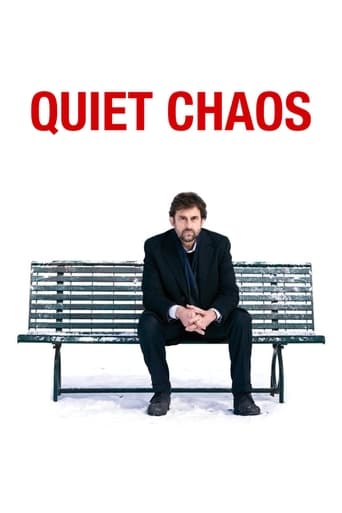GeneSiskel
With sex and death, the two staples of literature, hulking mostly in the background, Caos Calmo deals mainly with parenting, by a single father no less, and the ties that connect concerned parents and their children. The result is a nuanced, always interesting film about human interactions in the semi-sane modern world. I mean it as a compliment when I say it is the sort of movie Jane Austen might have scripted had she survived to the ripe old age of 233. The film happens to be set in present-day Italy so there is a bit of local color for Italophiles, but it could have been set in any modern Western nation. Pietro, a successful businessman, confronts the sudden death of his wife as he seeks to ease the transition for his now motherless ten-year-old daughter. Apparently to show her he is fully there for her, he abandons his office and waits for his daughter in the piazza outside her school each school day. Tutto il mondo comes to that piazza -- gossiping mothers, a developmentally challenged boy, Pietro's hot sister-in-law on the verge of a nervous breakdown, his secretary with papers to sign, his colleagues from the office stewing over the progress of merger negotiations and what it means to them, a young beauty with a big dog who needs a hug (the beauty, I mean), even Roman Polanski in a cameo appearance. Over the course of the picture Pietro convincingly works through his feelings about marriage, loss, grief, friendship, family, and desire. The emotional center of Caos Calmo is like a toned down, more serious sitcom, like Seinfeld on downers. As in life, there are small mysteries unsolved, but no scene -- surely not the much-discussed nighttime scene that serves to affirm life -- is out of place. The film works. Enjoy it.
gradyharp
Two middle-aged brothers - Pietro (Nanni Moretti) and Carlo (Alessandro Gassman) - play ball on the beach when suddenly two women yell for help while in the ocean. The brothers risk their lives to save the two women, only to find that the women don't even thank them. When the Paladini brothers drive back to Pietro's home, they discover that in their absence Pietro's wife has fallen and died. Pietro's 10-year-old daughter Claudia (Blu Yoshimi) is distraught and asks her father why he was not at home to save his wife. After a quiet funeral Pietro enters an existence of 'quiet chaos', neglecting his duties as a successful executive, choosing instead to sit on the bench across from Claudia's school, waiting each day in numbed silence for his daughter's completion of classes in order to drive her home. His only goal, despite various interruptions from passers-by and family members in incidents both humorous and distractingly serious, is to be there for Claudia, visible through her school window, to reassure her of his constant presence. How Pietro gradually figures out his grief, the world, and his place in it, discovering a new relationship with Claudia, forms the story line of this tender film. Director Antonello Grimaldi, working with a screenplay adaptation of Sandro Veronesi's book by Veronesi and Nanni Moretti, draws extraordinary performances from his cast of premiere Italian actors. In an classroom scene Claudia's teacher is explaining the word 'palindrome' (a sequence of units that can be read the same way in either direction) and shares with her pupils how some things are reversible while other things are irreversible. Grimaldi and his writers and actors demonstrate this term as it applies to human events in this thoughtful story. The film, in Italian with subtitles, appeals both to the intellect and to the emotions. It is a little treasure. Grady Harp
hand-eti
Nanni Moretti is not playing his neurotic self this time but he is quite convincing as a man who can't deal with his emotions at all. The good thing about the movie is that all little story lines keep on spinning around him and seem to go nowhere in the end.Just a few things put me off. I don't know if it was necessary to make the person a top manager. He doesn't seem the type to hold that sort of position. And the symbolism of the reversibility of palindromes is a bit cheesy and over the top.But the thing that really put me down is that one sex scene. There is nothing wrong with it in itself but it does not fit in this movie at all. The whole atmosphere changes, it is as if the movie stops, the sex scene starts, and when it's over the movie starts again. Not convincing at all.
chartang
Can't understand all the fuss about this movie. Yes, the photography is beautiful, but that's about all. Nanni Moretti is very good at playing himself, as usual, no matter what's the name or the role he is given. It's been said that's a movie about the absence of grief: but even to that effect the sense of grief should be somehow, somewhere implied, which it is not in the least. The ending is there just because the movie had to be ended, but it could have happened like that at any point. There is no change or development. Seemingly adult people talk as if they were permanently immature teenagers and a little girl comes out with a typically adult comment on her pairs. Comments upon life, society, corporations, etc., are a sequel of common places typical of talk shows. Would be dramatic sequences seem picked out from fashionable advertising clips and have the same emotional impact. The overrated and over-discussed torrid sex scene is just a softer imitation of hard core platitudes. No doubt there was matter for drama, but apparently the author didn't know how to deal with it: may very well be that, under this viewpoint, the script has been quite truthful to the Veronesi's novel it's been based on.



